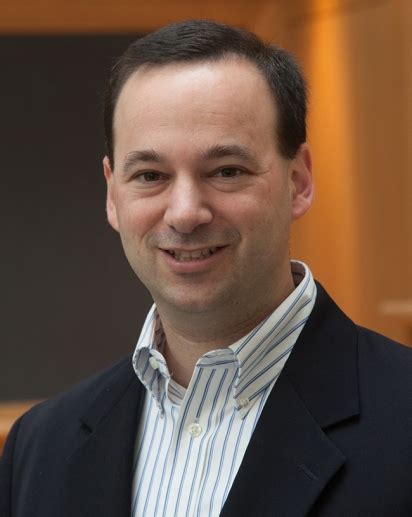Top 76 Causality Quotes & Sayings - Page 2
Explore popular Causality quotes.
Last updated on December 23, 2024.
Leadership is the name that people use to make sense out of complex events and the outcomes of events they otherwise would not be able to explain. In other words, people attribute leadership to certain individuals who are called leaders because people want to believe that leaders cause things to happen rather than have to explain causality by understanding complex social forces or analyzing the dynamic interaction among people, events, and environment.
You are smart people. You know that the tax cuts have not fueled record revenues. You know what it takes to establish causality. You know that the first order effect of cutting taxes is to lower tax revenues. We all agree that the ultimate reduction in tax revenues can be less than this first order effect, because lower tax rates encourage greater economic activity and thus expand the tax base. No thoughtful person believes that this possible offset more than compensated for the first effect for these tax cuts. Not a single one.
I have tried to read philosophers of all ages and have found many illuminating ideas but no steady progress toward deeper knowledge and understanding. Science, however, gives me the feeling of steady progress: I am convinced that theoretical physics is actual philosophy. It has revolutionized fundamental concepts, e.g., about space and time (relativity), about causality (quantum theory), and about substance and matter (atomistics), and it has taught us new methods of thinking (complementarity) which are applicable far beyond physics.
When confronted with a demand that the universe have a cause, infidels have usually pointed out that God was not much of an explanation. This is true enough, but not really a positive argument. After mechanistic explanation became popular, infidels liked to restrict causality to the chain of causes in an eternal material universe, pointing out that no supernatural cause was then necessary. Plausible, but still rather defensive. Today's skeptic can do better. In all likelihood, the universe is uncaused. It is random. It just is.
In one of the most brilliant papers in the English language Hume made it clear that what we speak of as 'causality' is nothing more than the phenomenon of repetition. When we mix sulphur with saltpeter and charcoal we always get gunpowder. This is true of every event subsumed by a causal law in other words, everything which can be called scientific knowledge. "It is custom which rules ," Hume said, and in that one sentence undermined both science and philosophy .
I cannot conceive of a personal God who would directly influence the actions of individuals, or would directly sit in judgment on creatures of his own creation. I cannot do this in spite of the fact that mechanistic causality has, to a certain extent, been placed in doubt by modern science. My religiosity consists in a humble admiration of the infinitely superior spirit that reveals itself in the little that we, with our weak and transitory understanding, can comprehend of reality. Morality is of the highest importance - but for us, not for God.
My father is a cultural anthropologist and my mother ran an outpatient clinic and treated a lot of people who had been institutionalised. I was very fascinated with behaviour and criminology and why people do things that don't make any sense. I would probe my mother: "Why? Why would somebody do this?" And look for some causality between someone's mental state and their behaviour. I think it had a lot of influence on me.
If time is treated in modern physics as a dimension on a par with the dimensions of space, why should we a priori exclude the possibility that we are pulled as well as pushed along its axis? The future has, after all, as much or as little reality as the past, and there is nothing logically inconceivable in introducing, as a working hypothesis, an element of finality, supplementary to the element of causality, into our equations. It betrays a great lack of imagination to believe that the concept of "purpose" must necessarily be associated with some anthropomorphic deity.
He [God] made us free, and He respects that. It is two different spheres of causality. Interdependent, though. It is not two boxes looking at one another without any kind of direct connections. There are very direct connections. That's why the question of "how are we free if God is omnipotent?" is a real, constant question. Ultimately, God is all powerful, and yet we are free.
To reduce the interpretation of the causality of all kinds of climate changes and of global warming to one variable, CO2, or to a small proportion of one variable - human-induced CO2 - is impossible to accept. Elementary rationality and my decades-long experience with econometric modelling and statistical testing of scientific hypotheses tell me that it is impossible to make strong conclusions based on mere correlation of two (or more) time series.
Climate change hype has grave real world consequences. It gets rich countries to adopt silly policies and to impose devastating eco-imperialism on poor countries. The world's rich millions can afford environmental extremism; its poor billions can't. Climate change pseudo-science about human causality has been exposed repeatedly. What's less appreciated is that there aren't more natural disasters in need of an explanation.
Knowing Chris Bennett's Writing as I do, I expected Only Superhuman to have an imaginative plot and a compelling superheroine in Emry Blair. What I hadn't expected was for the backstory to make so much sense. Usually science is the first causality of superhero stories, tossed aside with the breezy rationalization: 'Hey, it's comics!' Only Superhuman is, to my knowledge, the first hard science superhero story. And the Story is the better for it.
Most business leaders don't consider their own causality in the creation of problems. They fail to see that their company could have avoided breakdowns if they had acted differently. We tend to see problems as having been created by someone else or by the "economy". It's good to be a little introspective from time to time. Think about how your own behavior might have gotten your company into a problem, and how it may help to get you out.
In truth, one cannot, it seems, oppose mechanism and finalism, one cannot oppose mechanism and anthropomorphism, for if the functioning of a machine is explained by relations of pure causality, the construction of a machine can be understood neither without purpose nor without man. A machine is made by man and for man, with a view toward certain ends to be obtained, in the form of effects to be produced.
If we could travel into the past, it's mind-boggling what would be possible. For one thing, history would become an experimental science, which it certainly isn't today. The possible insights into our own past and nature and origins would be dazzling. For another, we would be facing the deep paradoxes of interfering with the scheme of causality that has led to our own time and ourselves. I have no idea whether it's possible, but it's certainly worth exploring.
The saying "no self, no problem" probably comes from Zen. In their cultures, where Buddhism is kind of taken for granted, as well as karma, causality, former and future life, and the possibility for becoming enlightened, then it's safe to skirt the danger of nihilism, which would be, I don't exist because Buddha said I have no self, and therefore I have no problem because I don't exist. That would be a bad misunderstanding. But in those cultures, it would not be as easy to have that understanding as it would be here in the west, where we really are nihilistic.















